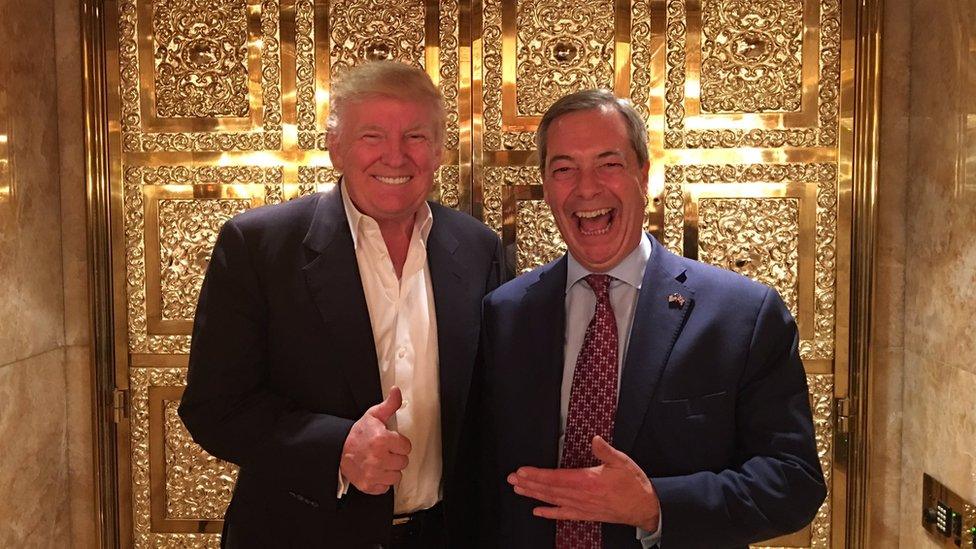Farage: 'Real opportunity' for UK business with Donald Trump
- Published

The president-elect welcomed the UKIP leader at Trump Tower
Nigel Farage has said there is a "real opportunity" for improved UK trade with the US, but politicians must apologise to Donald Trump after criticising him.
After meeting the president-elect - the first UK politician to do so - the UKIP leader said "be in no doubt" that Trump was a supporter of the UK, willing to be "very close partners."
Critics of Mr Trump should "stop whingeing" and "just get on with it."
Mr Trump, who takes office in January, has said the UK is a "special place".
The incoming US president has spoken to Theresa May by phone and there have been other contacts between ministers and representatives of the incoming administration.
Mr Farage, who campaigned alongside Mr Trump during the election, suggested that many British politicians, including some close to Theresa May, had been "quite rude" about him during his ascent to power and now must re-think their attitudes.
"I do think that just too many members of this government said too many nasty things about the President-elect, and I think there has to be a mending of fences," he said.
US election: Conservatives 'nasty' to Trump, says Farage
There were huge opportunities to be had in "Brexit Britain", Mr Farage said, and Donald Trump would be a much more accommodating partner than his predecessor Barack Obama - who he suggested had "damaged" the relationship between both countries.
Mr Farage told the BBC that there were some cabinet ministers who were open to the idea of his acting as a go-between with the president-elect, but said that Downing Street was more concerned with "saying I'm irrelevant".
He called on the government to work closely with Mr Trump, saying: "There's a real opportunity here."
"Not only President-elect Trump, but his whole team is Anglophile.
"They like our country, they recognise what we've done together in the past, and they're coming into this with an incredibly positive view. We need to seize the day."
Mr Farage denied that he would seek to work within Mr Trump's administration, saying: "I'm not an American citizen, I'm not going to be getting a job with his team any time soon."

Analysis
By Chris Mason, political correspondent
It's the image that encapsulates politics in 2016. President-elect Trump, in an open necked shirt, smiles, giving the thumbs up gesture.
He's standing, shoulder to shoulder, with Nigel Farage in front of a glitzy, golden backdrop inside Trump Tower in New York. Outsiders, who faced scorn and ridicule, they stand together now as winners. To be anti-establishment now is to be mainstream.
The two men, catalysts for political convulsions on both sides of the Atlantic, discussed "freedom and winning," UKIP sources said.
Their meeting was an embarrassment for Downing Street and stellar political theatre - but perhaps only that. Nigel Farage knows Mr Trump, but wields no power.
The challenge for the UK government now is to build bridges with a new American administration it didn't want, and didn't expect to win.

Mr Trump's call for a ban on Muslims entering the US at the end of 2015 led to a debate in Parliament on whether he should be barred from the UK while Foreign Secretary Boris Johnson, who was then Mayor of London, said Mr Trump must be "out of his mind".
Mr Trump's spokeswoman Kellyanne Conway said Saturday's meeting between the two men in Trump Tower had been "very productive" and that they had talked about "freedom and winning and what all this means for the world".
Mr Farage, who said Mr Trump "was relaxed, and full of good ideas", had joked on the way to the encounter that he was "just a tourist".
A UKIP spokesman had previously confirmed that Mr Farage asked Mr Trump to return a bust of Sir Winston Churchill to the White House Oval Office. Mr Farage said he had been "especially pleased" by Mr Trump's "very positive reaction" to the idea.
'Implausible'
A UKIP source said the meeting, held on 12 November, had "made the prime minister look very foolish".
Mrs May plans to visit Mr Trump in the first three months of next year after his inauguration.
Jeremy Corbyn: "I look forward to the conversation between my wife and Donald Trump. She is a proud Mexican."
The prime minister has said she hopes the two will be able to work on areas of mutual interest to enhance the special relationship between the two countries although some have said the government has no links with the Trump camp and will have to "start from scratch".
Crispin Blunt, chairman of the foreign affairs select committee, described as "completely implausible" the idea that Mr Farage would have an ambassadorial role in a Trump administration, telling the BBC there was "no need for Nigel".
Labour leader Jeremy Corbyn said he understood the appeal of Mr Trump's rhetoric to people angry at being "left behind" by globalisation but he said the president-elect needed to "grow up" when it came to his views on immigration.
Mr Corbyn, whose wife is Mexican, said the US economy was reliant on migrant labour and plans to build a wall on the border had caused "anger and outrage".
"I think the treatment of Mexico by the US, just as much as the absurd, abusive language to Muslims, is something that should be challenged and has to be challenged," he told the BBC's Andrew Marr show.